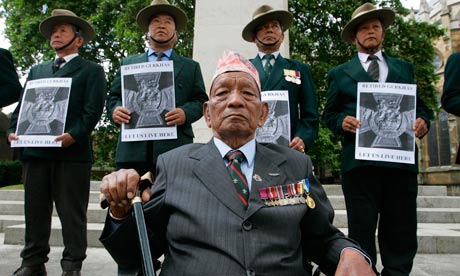Gurkha decorated for bravery who was a key figure in the campaign for veterans' rights

Lieutenant Tul Bahadur Pun in 2008 at a protest in London demanding Gurkhas’ rights.
The campaign succeeded the following year.
Tul Bahadur Pun, one of 13 Nepalese Gurkha soldiers who have won the Victoria Cross, has died aged about 88. The heroism that led to the award lifted the threat of imminent death to, among many others, Major James Lumley. In 2009, his actor daughter, Joanna, headed a successful campaign for Gurkha veterans' rights to live in Britain, with Lieutenant Pun's prominent support. He was reportedly born in 1923 at Banduk in western Nepal, but official records may have erred by as much as four years, suggesting a true age of up to 92 when he died. He volunteered for the Gurkhas and after training was posted to the 3rd battalion, 6th Gurkha Rifles, in the British-Indian army. By the end of May 1942, the Japanese had completed their conquest of Burma, then a British colony, and thus became a threat to British-ruled India. British forces retreated to India as the regional allied commands – British, Chinese and American – bickered about what to do next. The first counter-attack on Burma's Arakan coast at the end of 1942 failed completely. The allies agreed on major assaults on Burma early in 1944, just as the Japanese planned an attack on India from there by three army corps that had been built up along the border. American-led Chinese divisions would undertake the main attack in the north while the British 14th army under General William Slim attacked Arakan in the south. As a diversion, General Orde Wingate's Chindit force of nine brigades would stage a diversion in the central area. While Slim was halted at first by the Japanese advance, the northern assault went better. The Chindits were landed by air on 5 February and infiltrated the Japanese lines to attack their communications in support of US General Joseph Stilwell's thrust towards Myitkyina. The Chindits were ordered to harass the Japanese as they tried to concentrate in the Mogaung area for their attack on India. At the end of May the 77th Indian brigade, including the 3/6th Gurkha battalion, was told to seize Mogaung itself, leading to several weeks of bitter fighting in harsh terrain. On 23 June the battalion was ordered to capture a key railway bridge which was heavily defended by the Japanese, so much so that most of Rifleman Pun's B company were pinned down and his own section reduced to himself and two other men. Nevertheless, the three survivors launched an attack on a well-fortified strongpoint called the Red House. Pun's two companions were both badly wounded in the charge, but he picked up their only Bren light machine gun and carried on, firing from the hip as he ran across 30 yards of muddy and cratered open ground, miraculously unscathed. He blasted his way into the Red House and cleared it of at least eight Japanese, enlisting two captured machine guns in support of his comrades following behind, sparing untold numbers, including Major Lumley, from further withering fire. The ensuing capture of Mogaung was a turning point in General Slim's ultimately successful campaign after the defeat of the Japanese at Kohima and Imphal. After the war, Pun transferred out of the army of newly independent India in 1947 into British service with the 2nd/6th Gurkha rifles, with whom he served in Malaya and Hong Kong, rising to the rank of regimental sergeant major. On his retirement in 1959 he was promoted to honorary lieutenant and returned to farm at Banduk. In rapidly declining health in 2007, Pun was refused permission to settle in Britain. The decision was overturned after protests, and he moved to west London, becoming a freeman of the borough of Hounslow in 2009. By then he had also become a figurehead in Joanna Lumley's well-publicised campaign for the right of all Gurkhas who had served four years or more with the British army and retired before 1997 to settle in Britain. He was often seen seated next to her at campaign events with stick, cap, suit, white shirt, regimental tie and a long row of medals, with the VC in pride of place. Pun was married twice. His second wife, Punisara, two sons and eight daughters survive him. • Tul Bahadur Pun, soldier, born perhaps 23 March 1923; died 20 April 2011
No comments:
Post a Comment